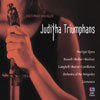Vivaldi Juditha Triumphans
A dramatic reading of Vivaldi’s bloodthirsty Old Testament oratorio
View record and artist detailsRecord and Artist Details
Composer or Director: Antonio Vivaldi
Genre:
Vocal
Label: ABC Classics
Magazine Review Date: 10/2009
Media Format: CD or Download
Media Runtime: 0
Mastering:
Stereo
Catalogue Number: ABC476 6957

Tracks:
| Composition | Artist Credit |
|---|---|
| Juditha Triumphans |
Antonio Vivaldi, Composer
Antonio Vivaldi, Composer Attilio Cremonesi, Conductor Cantillation David Walker, Countertenor Orchestra of the Antipodes Sally-Anne Russell, Mezzo soprano Sara Macliver, Soprano |
Author: David Vickers
The Sinfonia (arranged from RV562 by assistant director Benjamin Bayl) and opening chorus crackle with raw energy. Attilio Cremonesi’s interpretation certainly has ample spirit and flair in fast music, even if it eschews the more natural and elegant approach readily apparent in King’s performance. Unlike Vivaldi’s all-female performance at the Pietà, Cantillation’s tenors and basses are men, and Holofernes is sung by countertenor David Walker (notwithstanding his illustrious opera CV, this is a rare appearance on disc). I enjoyed Sara Macliver’s unforced stylishness, Fiona Campbell’s understated singing in the beautiful pastoral sleep scene “Umbrae carae”, and Sally- Anne Russell’s sensitive vocal interplay with soft exotic instrumental colours (solo viola d’amore in “Quanto magis”, chalumeau in “Veni, me sequere fida”, mandolin in “Transit aetas” and viols in “In somno profundo”). The finest music-making from singers and players alike is most frequently to be found in the gentlest arias. Elsewhere it seems as if Cremonesi resolved for the Orchestra of the Antipodes to make as bold an impact as humanly possible. This provides visceral excitement but only really suits Vagaus’s venomous rage aria “Armatae face” (sung upon discovering his murdered Assyrian lord), and beforehand does not always serve Vivaldi’s music faithfully. Cremonesi’s over-arpeggiated harpsichord showboating during recitatives is an interventionist impediment but he paces the gaps between recitatives and arias superbly, and overall Pinchgut Opera’s sixth CD production is its best so far.
Discover the world's largest classical music catalogue with Presto Music.

Gramophone Digital Club
- Digital Edition
- Digital Archive
- Reviews Database
- Full website access
From £8.75 / month
Subscribe
Gramophone Full Club
- Print Edition
- Digital Edition
- Digital Archive
- Reviews Database
- Full website access
From £11.00 / month
Subscribe
If you are a library, university or other organisation that would be interested in an institutional subscription to Gramophone please click here for further information.




